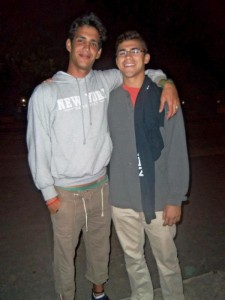Many people are drawn to Cuba by the allure of days gone by, phenomenal music, or the idea of the nation as a communist stronghold by America’s backdoor.
But for Alexander Amador ’15 (Fairfield, Conn.), his decision to study for a semester at the University of Havana had a more personal motivation: He wanted to discover his identity as a Cuban-American.

Alexander Amador ’15 (right) with a friend in Cuba
His grandparents left Cuba for the United States in 1963. The embargo in Cuba had kept him from visiting the country and meeting his family who still live there.
Amador focused on learning Spanish, speaking the language with a Cuban accent, and assimilating to Cuban culture as much as he could.
Studying alongside Cuban students, he took the courses History of Philosophical Thought, The History of Cuban Culture, Cuban Sociological Thought, The History of Cuba, and Social Anthropology.
“The History of Cuban Culture was one of my favorite courses,” he says. “I learned about Cuban music, art, and movies. It was so interesting and the professor was phenomenal. My other favorite was the History of Cuba, which was mind-blowing to see how differently they taught their history compared to how it is taught in the U.S.”
Amador was impressed by the public education system.
“You won’t find any smart boards or high tech learning methods,” he says. “Instead it’s a blackboard with a piece of chalk, but the result of the academic system in Cuba is an extremely educated population. Students can pursue a degree of any type in any academic field for free, whether they want to be a cardiac surgeon or a chemical engineer.”
As an international affairs major, Amador plans to specialize in Latin America. He is not sure what he wants to do after he graduates, but is considering joining the Peace Corps, working for the government in international relations, or working for the private sector.
“I had such a great experience and I will cherish my memories of Cuba forever. It really fulfilled my lifetime dream of unveiling the mystery of my roots and helped me understand my identity. I now can truly say that I know the place where my grandparents came from,” he says.
